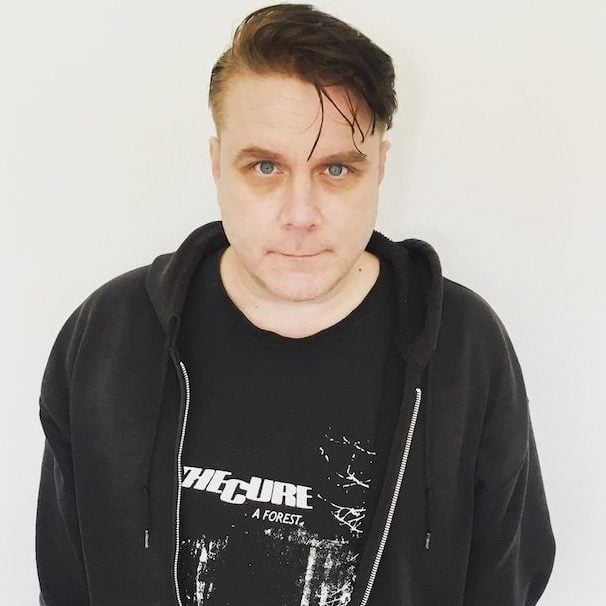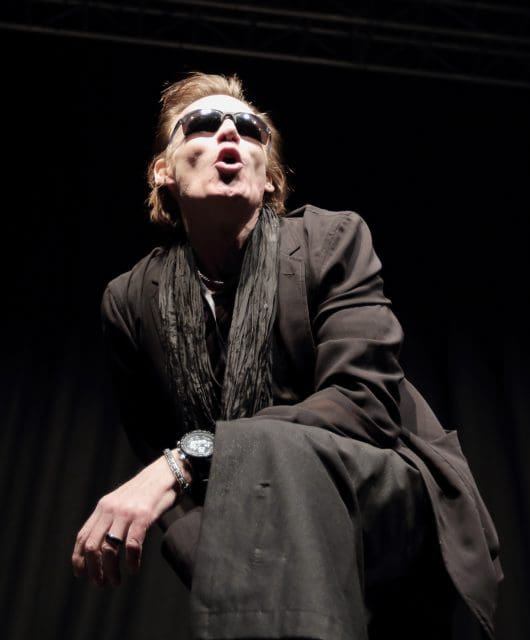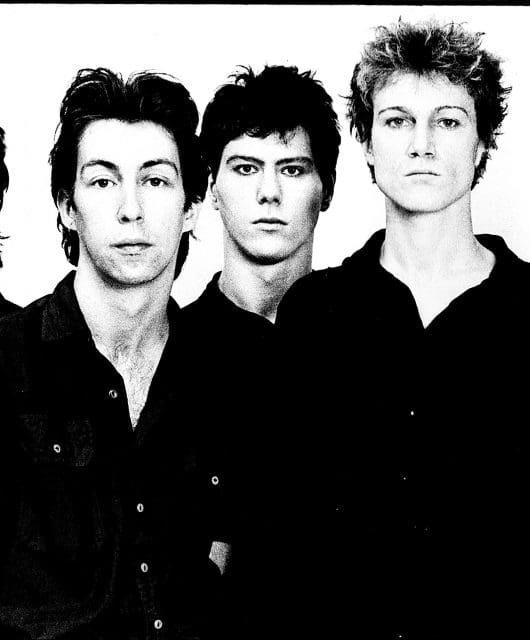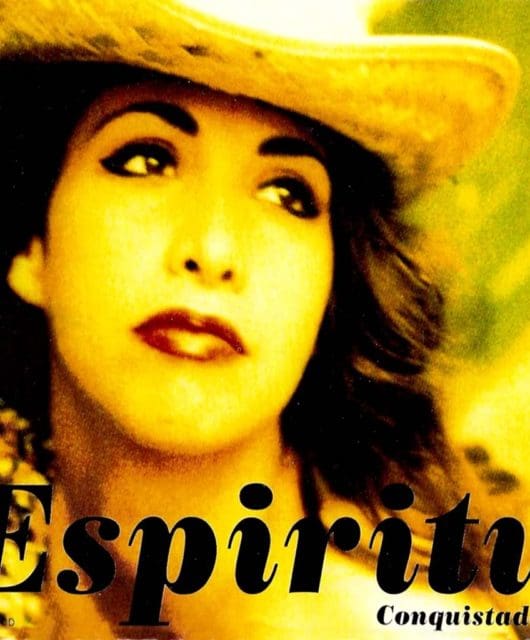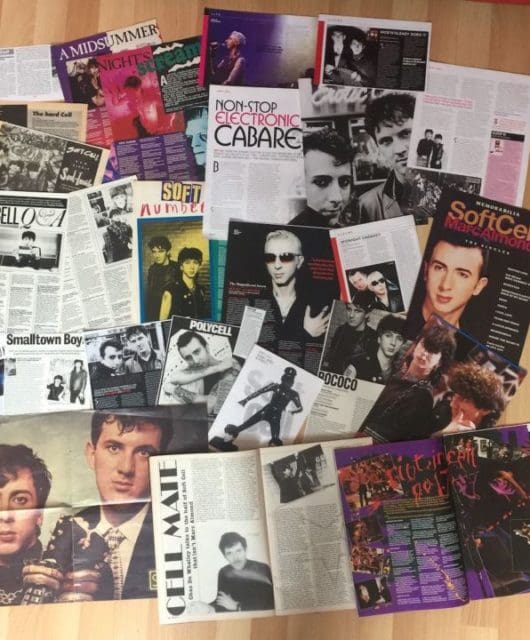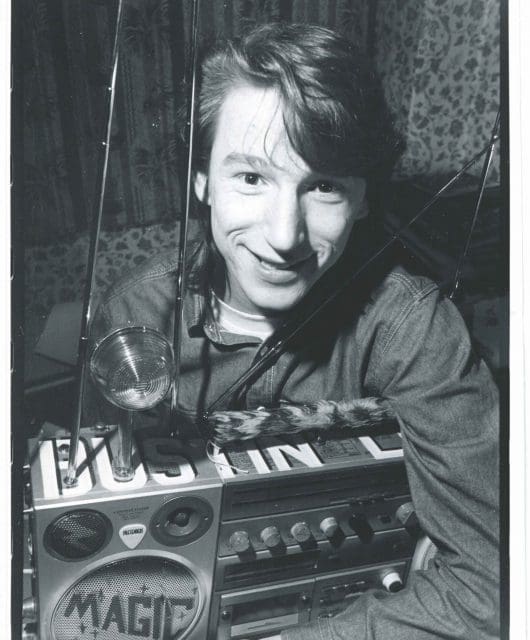Classic Album: Stevie Wonder – Hotter Than July
By Dan Biggane | March 26, 2024
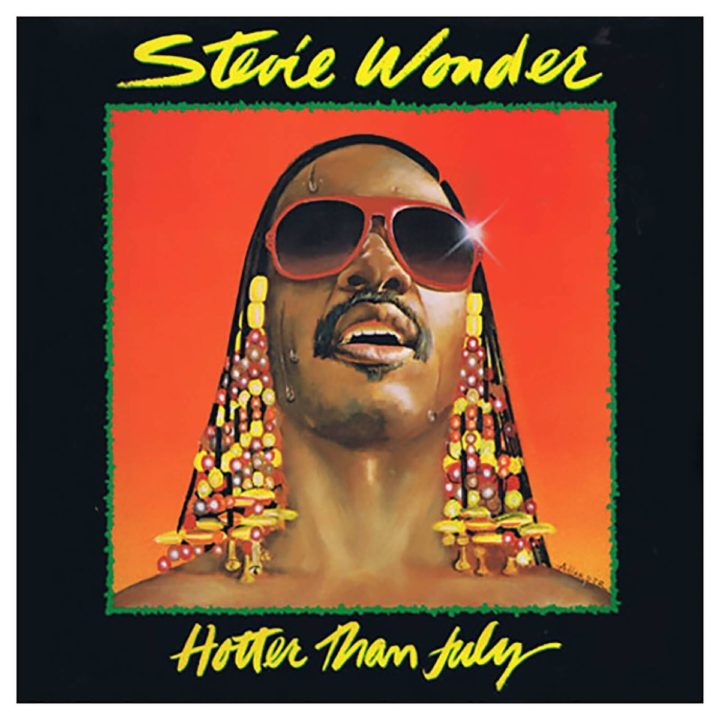
The first Stevie Wonder album of the 80s was a back-to-basics return to form. A tight collection in which The Motown legend plays it safe with his trademark funky soulful pop but delivers a punch through ardent political activism. Words Felix Rowe
“I hear music in colours.” So once sang a certain Classic Pop favourite (that’s Stephen Duffy, by the way). It’s an evocative notion that conjures up rich imagery in the mind’s eye; a feast for the senses whereby sounds are expressed in a vibrant palette of hues. But if the idea could be said to embody any musician, then first in line must surely be Stevie Wonder.
Raw Emotion
For someone who has been without sight since infancy, Stevie Wonder not only hears music in colours, he sees – and paints – colours through music. Hotter Than July is the perfect embodiment of that. Just like the album cover itself that glows in sun-dappled fervour, the music within is positively bursting with colour. The kind of warm, inviting, fully-saturated tones that instantly emit the feelgood factor. It radiates energy in that totally unique and refreshing way that only Stevie knows how.
From the opening howl of raw emotion to its concluding rallying cry, Hotter Than July is a celebration of vitality, expressed with unbridled joy and Wonder’s instinctive musicality. But underneath the record’s exterior, there’s a second layer that throbs with deep-rooted politics and social activism. Again, this duality is reflected in the packaging: flipping the cover image of Stevie in sweating ecstasy will reveal a portrait of Martin Luther King Jr on the inner sleeve, flanked by photographs portraying (white) police brutality against Black civilians and peaceful protesters. This stark imagery is accompanied by a dedication calling for King’s birthday to be officially recognised as a national holiday, while seeking an end to “bitter confrontation and inevitable bloodshed.”
To the uninitiated, the ubiquitous Happy Birthday – with its sugar-rush nursery-rhyme chorus – could be dismissed as a slightly anodyne, corny-but-harmless soundbite, custom-made for singing birthday cards.
Silky Delivery
In fact, it’s a deeply political call to action to counter social injustice and inequality. Like Born In The USA a few years later, the buoyant singalong chorus obscures the harder-hitting message of the verse. Wonder’s silky delivery can be too sickly sweet for some tastes. But, to guarantee its effect, he’s canny enough to sugar-coat the pill to make sure it’s swallowed.
Elsewhere Cash In Your Face tackles the injustices of racial discrimination via some of Stevie’s most direct lyrics – pitched as a conversation in which a Black man is turned down for a tenancy based on the colour of his skin, regardless of his ample funds or ‘respectable’ job. Meanwhile, Wonder’s Bob Marley tribute Master Blaster (Jammin’) touches on race politics, noting that “the world’s full of problems” while referencing the recent war in Zimbabwe. Ultimately, though – and this is characteristic throughout – the underlying message remains positive and celebratory.
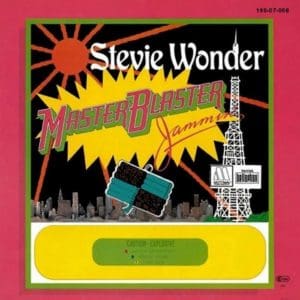
Feeling Hot
The heat metaphor of the album’s title and artwork, then, takes on several meanings. While it was released after a particularly scorching summer, the rising temperate reflects the mood of the nation. It’s a political heat – the sense of tension bubbling up, pressure reaching boiling point, ready to explode. This immediacy presents a stark contrast to the meandering, bucolic nature of its predecessor, Journey Through The Secret Life Of Plants.
Throughout the 70s, Stevie enjoyed a phenomenal run of classic cuts working with TONTO’s Expanding Head Band, from Music Of My Mind through to Songs In The Key Of Life. Each release pushed him artistically, while reaping rewards critically and commercially. But a decade that should have culminated in celebration ended on a somewhat damp note.
Back To Business
Whilst 1979’s Journey Through The Secret Life Of Plants didn’t exactly tank, nor was it received with the universal adulation Wonder had become accustomed to. Given that it was a soundtrack to accompany a TV documentary, largely comprising instrumentals, maybe that shouldn’t have come as a surprise.
It seems a little unfair to label his next album a ‘comeback’, but there’s certainly a feeling of getting back to business on Hotter Than July. At 10 songs, it’s succinct and focused, with not a meandering instrumental in sight. Stevie sticks to the script and keeps to the point, condensing each track down to the good stuff. It’s even sequenced like a mixtape, one track often switching straight into the next with barely a second to catch your breath.
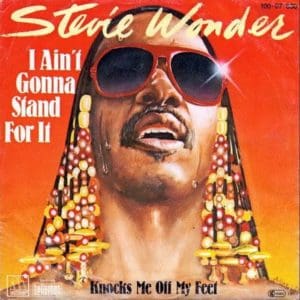
Stevie In Wonderland
Wonder had recently bought his own studio – an obsolete radio studio, at one time favoured by Nat King Cole. By now, it was an empty shell, stripped of all its equipment. All that remained was its incredible acoustics and a lingering sense of Cole’s aura. The absence of a control room and equipment was solved by renting a mobile recording truck (of the type used to document live concerts) and backing it up into the parking lot. But this was no ordinary truck. Stevie’s steadfast commitment to pushing the envelope gave him access to Sony’s trailblazing digital technology. A jumbled mass of cables was uncoiled from the truck into the performance room and voilà: a fully functioning recording studio. All it needed now was a name: ‘Wonderland’.
Studio technician, Lon Neumann, came with the truck. Speaking to Okayplayer in 2020, Neumann recalls those incredible sessions working “elbow-to-elbow” with Wonder in that cosy space. The typical workflow involved the core band laying down the foundation of a track, before Stevie went back to tinker with parts and overdubs, phrase by phrase, to achieve the total perfection he demanded. The band’s musicality was particularly evident in bassist and de facto bandleader, Nathan Watts, who was in perfect sync with Wonder. Guests included a cripplingly shy Michael Jackson, dropping in flanked by his personal bodyguard, to record backing vocals among several other Motown and soul alumni. As for Stevie himself, Lon describes being acutely aware that he was in the presence of a genius.
Genius Mind
According to Neumann, one intriguing offshoot of Wonder’s blindness is that his body clock is not calibrated to night and day like everyone else. He would work at any hour and expect his team to be ready when inspiration struck. Invariably, this meant a 3am summons via pager… only to then be kept waiting. When Stevie wasn’t committing his genius to tape, he was constantly glued to his special Braille-equipped phone, engaged in multiple calls at once to the great and the good – presumably, just calling to say he loved them.
Wonder’s array of equipment included a prestige Bösendorfer grand piano that would set one back the price of a comfortable house, famed for possessing several extra keys beyond the standard 88-note keyboard. Because, you know, Stevie just needs that little extra.
Neumann recalls L.A.’s go-to piano tuner being called in, to make the tone brighter for a particular vibe Wonder was after. The piano tuner used his tried-and-tested hack: coating lacquer onto the hammers that strike the piano’s strings to add that special ‘zing’. However, when he employed a heat-shrinking gun to help the lacquer dry a little quicker, the highly flammable concoction swiftly combusted, setting Stevie’s treasured instrument ablaze. Literal proof that Wonder’s keyboard is indeed smoking hot.
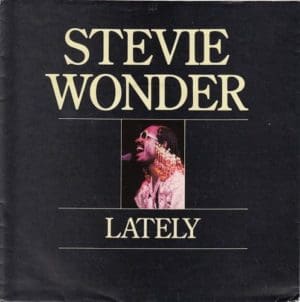
Funky R&B-Soul Hybrid
As to the sound they forged, it’s harking back rather than pushing forwards. Musically, Hotter Than July is fundamentally rooted in the funky R&B-soul hybrid that Stevie perfected in the 70s: an organic, natural, groovy sound, played by living beings and bursting with humanity. This is Wonder absolutely cruising on familiar ground and well-travelled roads. Not coasting on auto-pilot, but comfortable and in total control.
The only genre outlier is the fantastic single, I Ain’t Gonna Stand For It, in which Stevie does a bizarre-but-fun, gravelly country singer impression, supported by renowned country guitarist Hank DeVito on steel guitar. Yet even this can’t hold back the funk by the time it gets to the chorus.
While the game-changing TR-808 and Linn LM-1 drum machines were both released in this year, neither of them makes much of an appearance on Hotter Than July with the exception of the latter possibly featuring on Happy Birthday.
Fresh Sound
Though Wonder was certainly playing with them in his creative process (as an impromptu performance at Abbey Road for Newsnight highlighted), they were more writing aides as opposed to style choices utilised for their rigid mechanical aesthetic.
To some degree, Hotter Than July marks the end of Wonder’s reign as an R&B innovator. A burgeoning breed of sleek, taut, future-funk was beginning to explore fresh ground – clearly indebted to Stevie’s innovations, yet also taking cues from other sources: the emerging synth-pop, electronic dance music and New Wave. Michael Jackson and Prince would soon release landmark albums that shaped the next decade, and indeed the very future of pop.
For the first time, Wonder was beginning to sound a little out of step with the current cool kids. His biggest hit was yet to come (1984’s saccharine worldwide No.1, I Just Called To Say I Love You), but by that point he was the established veteran playing it safe, not the young maverick innovator he once was.
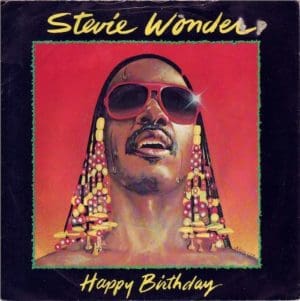
Black Lives Matter
Hotter Than July is perhaps, then, the last great Stevie album. While it sits proud beside his finest records of his 70s sweet spot, it doesn’t quite match their vision or breadth of scope. But it excels in its sheer zest for life. Speaking to Jazzwise in 2019, bassist Avishai Cohen selected Hotter Than July as his life-changing album, summing it up as “one big chunk of happiness”. It’s just pure joy. A funk workout of the highest calibre, displaying incredible dexterity and an immensely satisfying experience for the ears.
Hotter Than July doesn’t break new ground for Wonder, but it celebrates the territory already hard fought and won. If it’s not hugely radical by his own great standards, it’s (just) fantastic pop music, meticulously crafted. However, the real power of Hotter Than July is the impassioned political message nestled within its jubilant grooves. The call for racial equality remains extremely prescient today in context of Black Lives Matter and ongoing debates over representation and police brutality in the United States. Stevie’s form of activism centres on peaceful progress, finding common ground and reasons to celebrate.
No surprise then that the album lends its name to a Detroit-based festival celebrating the Black LGBT community. Hotter Than July’s final track, Happy Birthday proves that – just sometimes – a pop song really can transcend its form and work wonders.
Read More: Top 40 Stevie Wonder songs – year by year
TRACKS
DID I HEAR YOU SAY YOU LOVE ME
Hotter Than July opens with a swooshing crescendo, the build-up of heat and pressure, before Wonder releases the tension in an instant with a screaming “Yow!” And so the funky onslaught begins. He’s straight into business with an incessantly groovy workout from the rhythm section, with syncopated horn stabs. At the height of its intensity and momentum, it ends abruptly like a radio changing channel into the next track.
ALL I DO
The origins of this track go way back to 1966, when a young Stevie co-wrote it with Motown’s Clarence Paul and Morris Broadnax. This particular incarnation is the type of fabulously funky slow jam with woozy chords and retro-future bass synths that’s found favour with Thundercat and Childish Gambino in recent years. All I Do is seriously funky in an understated way, enhanced by subtle and shimmering flutes that flutter gently, almost hidden in the mix. Like the opener, it gradually builds in intensity. Listen closely, you might just hear Michael Jackson performing backing vocals.
ROCKET LOVE
Another slow jam; extremely sparse with oodles of space in its minimalist arrangement, as Wonder sings sweetly in ad-libbed “doo doo”s. A slightly sinister mood is evoked by the chromatic riff that has become a signature in 007 movie scores (and what a fantastic alternative Bond theme this would have made). Rocket Love features an intricate and inspired string arrangement from Funk Brother, Paul Riser, that adds to the grandiose atmosphere, alongside fingerpicked acoustic guitars. From understated beginnings, it ramps up to a rousing, screaming vocal from Stevie, exorcising his soul demons. It’s the kind of soulful ballad that John Legend has made his bread and butter.
I AIN’T GONNA STAND FOR IT
Something so totally different and initially jarring that many listeners may have done a double-take just to be sure a random Johnny Cash track hasn’t snuck its way onto the playlist. I Ain’t Gonna Stand For It kicks off with strummed acoustic guitar chords and a most un-Wonder-like vocal – low, raspy and growling like a spit-n-sawdust bar-stool bawler. Is that really Stevie? He’s having fun with a country song pastiche with its slide guitar and curiously straight drive-time drums, before it gets back to more familiar ground with the funky Superstition-esque clavinet in the chorus, featuring backing vocals from The Gap Band. There’s some seriously funky slap bass from Nathan Watts in the outro coda over duelling guitars and Wonder wailing, before again ending abruptly like a colossal freight train coming to an instant stop. Eric Clapton did a faithful cover on his 2001 album, Reptile.
AS IF YOU READ MY MIND
A jittery piano intro, very busy, almost calypso or bossa nova-like in its frantic rhythm and the first and only track on the record to showcase Wonder’s signature harmonica. It’s one of the busiest arrangements on the album, very funky and catchy, though leaving little space for the ear to rest. As If You Read My Mind has a notable acid jazz feel – laying a clear pathway for 90s UK groups like Brand New Heavies and Jamiroquai.
MASTER BLASTER (JAMMIN’)
After the funk onslaught of the previous track, Master Blaster is a breath of fresh air. Stevie’s biggest hit off the LP is an ode to Bob Marley, with whom he had recently toured, and who’s both namechecked in the song and referenced in the title. The album itself takes its name from the opening lines, again a reference to a Marley concert on a scorching day. While the influence and dedication is laid bare, it’s still totally and unmistakably Stevie Wonder. Stateside, it topped the R&B charts for seven weeks and made the Top 5 of the Billboard Hot 100. It hit the top spot in New Zealand and just missed it in the UK, at No.2.
DO LIKE YOU
One of the more forward-looking tracks, opening with samples of children speaking, before jittery synths come in over a funky beat, enhanced with frenetic cowbell percussion. The funky syncopated brass throughout recalls that of Sir Duke, while the samples of speech, coupled with the way the track snaps and pops, inject a fresh, feelgood vibe.
CASH IN YOUR FACE
A comparatively slower track, very cool and loaded with street swagger. It contains some of the album’s most direct and upfront lyrics about social injustice, delivered via a raw but soulful Stevie vocal. It’s all the better for hanging back a little, and its inherent strut gives it the distinct vibe of early hip-hop. All it needs now is De La Soul to pop in for a guest verse, and if it hasn’t been sampled by them already, then it jolly well should be.
LATELY
A Wonder ballad at its very best, Lately is distinctly different to everything that precedes it, so simple and effective in its stripped-back form: just Stevie, piano, a fretless bass and a couple of simple overdubs. It’s the kind of melodic melodrama that’s custom-built for X-Factor auditions and its slow-motion montages. But in Wonder’s hands it’s pure bliss. A contemporary TV performance around the release highlights his gift for expressing the song’s emotion, just the right side of sappy. It’s at once life-affirming and devastating. It enjoyed a second lease of life in the 90s, when R&B group Jodeci performed a storming version on MTV Unplugged. It went on to become one of their signature tunes, scoring an R&B No.1, and charting notably higher than Stevie’s original in the US.
HAPPY BIRTHDAY
The only track to noticeably use programmed drums (what sounds like a Linn LM-1), and featuring a slightly tinnier pop sound compared to the rest of the record. Curiously, considering its significance in US history and subsequent inception into Stevie’s canon, it wasn’t released as a single in the States. However, in the UK it was one of his biggest-selling hits, like Master Blaster (Jammin’) just missing out on the top spot (kept at bay by Michael Jackson with his first UK solo No.1, One Day In Your Life).
Though musically, it’s the weakest and least interesting track on the album, it’s without doubt the most culturally significant. It set out with a specific goal – to get Martin Luther King’s birthday officially recognised as a national holiday – and it achieved it. Happy Birthday has itself become a national institution in the US. Particularly among some Black communities, it has usurped the traditional song to become the definitive birthday celebration, integral as the cake.
Listen to Hotter Than July here
Sign up for the Classic Pop newsletter
